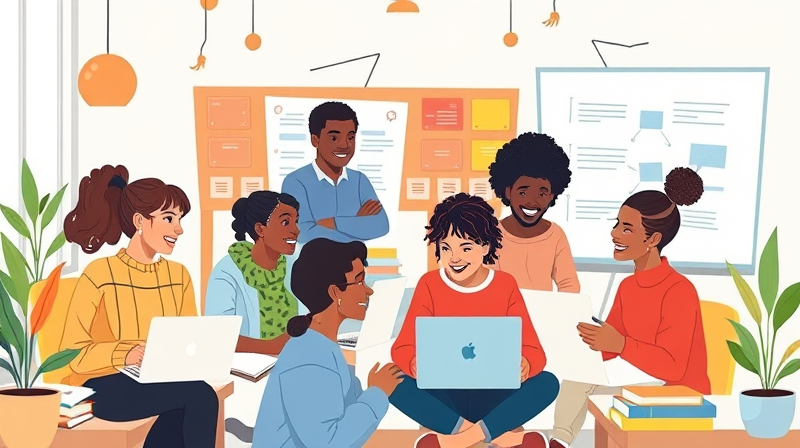Group study sessions provide a great opportunity to enhance learning, boost collaboration, and promote an atmosphere of collective growth. When participants come together with a structured plan, diverse expertise and enthusiasm can transform the way each individual understands and retains complex subjects. This article presents creative methods that make group study sessions not only productive but also fun and inspiring.
Creating a purposeful study environment begins with structuring sessions around clear, actionable goals. Then, integrating engaging techniques and customized activities ensures that every participant feels included and motivated to contribute. These strategies foster not only academic success but also personal development and confidence.
Group Study Session Strategies
One of the primary virtues of group study is the variety of approaches that can be applied to suit different needs and learning styles. Whether you are preparing for exams or tackling challenging topics, a well-organized study session can streamline the process and provide insights beyond individual efforts.
- Plan a Structured Agenda: Start each session with a clear agenda. Define goals such as working through specific chapters, solving sample problems, or debating key themes. This focus not only provides direction but also sets a tone of commitment.
- Adapt to Learning Styles: Incorporate techniques that cater to various learning types. Visual learners might benefit from diagrams and mind maps, while auditory learners can thrive with discussions and verbal explanations. For kinesthetic learners, include hands-on activities like simulations or role-playing scenarios.
- Employ Collaborative Techniques: Methods such as the Jigsaw Method, where each member becomes an expert on a section of the study material, and Round Robin Discussions, in which everyone shares thoughts in a systematic order, can encourage peer teaching. These techniques promote active participation and deeper understanding.
- Integrate Technology: Leverage digital tools like Google Docs for collaborative note-taking and management platforms like Trello to organize session tasks. Incorporating interactive quizzes, flashcard apps, or online presentation tools can add a dynamic twist to study sessions.
- Create a Comfortable Environment: Choose a location free of distractions, such as a quiet library or a dedicated study room. Warm up with ice-breaking activities to foster rapport among participants and establish a supportive learning community.
- Schedule Regular Breaks: Short breaks between study intervals can help maintain high levels of concentration and energy throughout the session, ensuring that the learning process remains effective and enjoyable.
- Incorporate Fun Activities: Integrating educational games like trivia or Jeopardy-style challenges makes learning enjoyable and reinforces key concepts. This balance of fun and study helps in consolidating the lesson content at the end of the session.
These strategies, when properly implemented, enhance accountability, encourage active participation, and build a confidence that propels students to communicate ideas more effectively and think critically about challenging topics.
Knowledge Sharing Techniques
Turning group studies into platforms for knowledge sharing can create a culture of mutual support and continuous improvement. Sharing knowledge is as beneficial as acquiring it, and by incorporating these techniques, everyone gains from the wealth of collective experience.
- Foster a Knowledge-Sharing Culture: Create safe spaces where students or team members can freely exchange ideas and ask questions. When open dialogue is encouraged, the environment becomes more conducive for learning and feedback.
- Utilize Knowledge Management Systems: Organize resources using digital platforms that centralize study materials and facilitate collaboration. Tools like Slack, Microsoft Teams, or Tettra provide a seamless way to manage and update shared content in real time.
- Mentorship and Peer Support: Encourage more experienced members to mentor newcomers. Structured partnerships give rise to a process in which learning is bi-directional, ensuring complex topics are broken down into manageable parts.
- Host Thematic Knowledge Sessions: Organize special sessions focused on current challenges or emerging trends. Inviting a subject expert can also lend fresh perspectives and innovative study techniques.
- Promote Reflection and Feedback: At the conclusion of each session, reserve some time for reflections. This debriefing allows the group to discuss strengths and areas for improvement, setting the stage for continuous enhancement of future sessions.
- Break Down Complex Topics: For topics that are hard to digest, employ a divide-and-conquer strategy. Breaking subjects into smaller components makes it easier for everyone to grasp the intricate details through collaborative problem-solving.
The deep benefits of group study and knowledge sharing extend well beyond exam preparation. This cooperative learning environment reinforces accountability, initiates critical thinking, and motivates participants to articulate ideas with clarity. Students become more adept at problem-solving by blending diverse perspectives into a unified understanding.
Cultivating a spirit of collaboration in group study sessions is more than just a method of learning; it’s a practical approach that nurtures soft skills like empathy, communication, and teamwork. These sessions not only prepare individuals academically but also build the foundations for lifelong learning and professional excellence.
In conclusion, the benefits of group study sessions and knowledge sharing are profound. They help break down learning barriers, prevent the formation of information silos, and create an environment where every member can flourish. With thoughtful planning and a variety of effective techniques, any study group can transform into a dynamic community of learners, ready to face academic challenges and beyond.
Adopting these ideas can infuse energy into your study sessions, making them a powerful gateway for both academic success and personal growth. Whether in a classroom, office, or informal study group, the fusion of structured activities and a knowledge-sharing mindset paves the way for excellence.
Embrace these methods to not only boost your study sessions but to also inspire a culture where learning is a shared celebration of collective progress and achievement.







